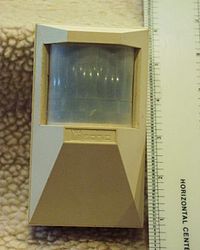
Photo from wikipedia
High-accuracy temperature measurement plays a vital role in biomedical, oceanographic, and photovoltaic industries. Here, a highly sensitive temperature sensor is proposed and demonstrated based on cascaded polymer-infiltrated Mach–Zehnder interferometers (MZIs),… Click to show full abstract
High-accuracy temperature measurement plays a vital role in biomedical, oceanographic, and photovoltaic industries. Here, a highly sensitive temperature sensor is proposed and demonstrated based on cascaded polymer-infiltrated Mach–Zehnder interferometers (MZIs), operating near the dispersion turning point. The MZI was constructed by splicing a half-pitch graded index fiber (GIF) and two sections of single-mode fiber and creating an inner air cavity based on femtosecond laser micromachining. The UV-curable polymer-infiltrated air cavity functioned as one of the interference arms of MZI, and the residual GIF core functioned as the other. Two MZIs with different cavity lengths and infiltrated with the UV-curable polymers, having the refractive indexes on the different sides of the turning point, were created. Moreover, the effects of the length and the bending way of transmission SMF between the first and the second MZI were studied. As a result, the cascaded MZI temperature sensor exhibits a greatly enhanced temperature sensitivity of −24.86 nm/°C based on wavelength differential detection. The aforementioned result makes it promising for high-accuracy temperature measurements in biomedical, oceanographic, and photovoltaic applications.
Journal Title: Polymers
Year Published: 2022
Link to full text (if available)
Share on Social Media: Sign Up to like & get
recommendations!